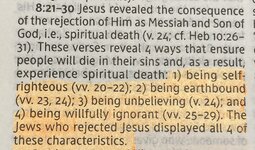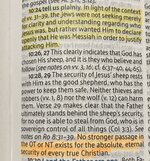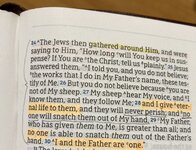John 4
The Samaritans and the woman place their faith in Christ. This idea of no teacher but God is a distinct promise of the New Covenant. John will employ it again in John 6 and 1 John. Jeremiah said that within the New Covenant, no man will tell his neighbor to know God because all will know God because God Himself will write His Law on their hearts and minds. That is to say, God is the one who converts the hearts and minds of men. Do not boast about how many people you have "led to Christ." All such boasting is vainglory and does nothing other than puff up men's pride. Either they believe in you or they believe in God. But be content that God may use you to further His kingdom and what we should say is "We have only done what was required of us" and not think higher of ourselves than we ought. Likewise, do not give the glory to men, so they aren't tempted to pride, but thank God.40 So when the Samaritans came to Jesus, they were asking Him to stay with them; and He stayed there two days. 41And many more believed because of His word; 42and they were saying to the woman, “It is no longer because of what you said that we believe, for we have heard for ourselves and know that this One is truly the Savior of the world.”
Jesus says the word and the son of the man who came to Him was healed. Read His Word and see all the signs that God has already given. What more does He need to do to show men that He alone is worthy of their faith? And we would not even exist if it were not for His Word, so treat His Word as all-sufficient.48 So Jesus said to him, “Unless you people see signs and wonders, you will never believe.”



